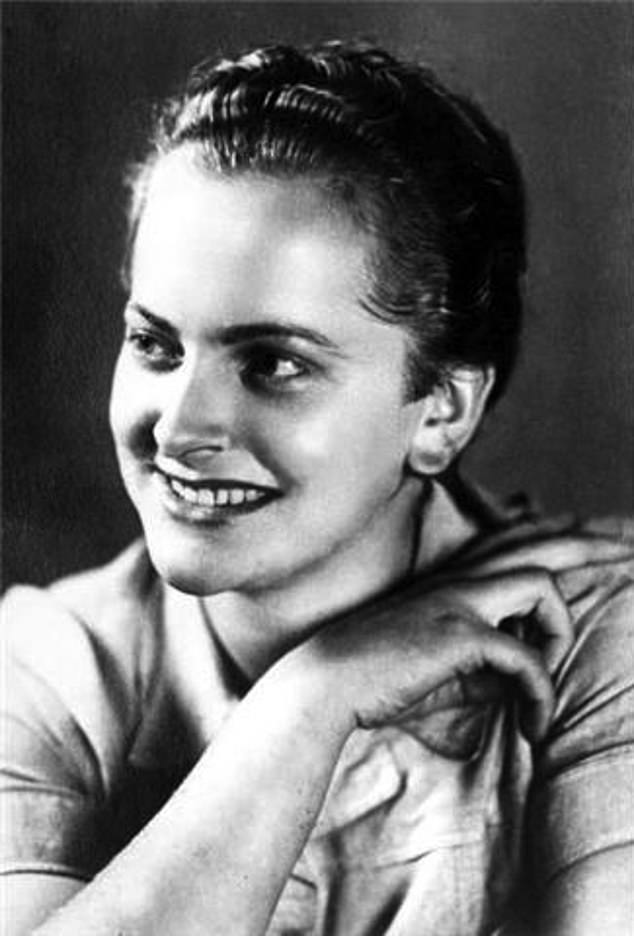Every day, Irma Grese would strut across the concentration camp courtyard wielding her three weapons of choice: a pistol, a horse whip and her polished jackboots.
Famed for her ‘Hollywood filmstar’ looks, history remembers the Nazi ‘Hyena of Auschwitz’ for her callous, arbitrary use of these weapons on emaciated prisoners at the death camp.
But equally disturbing was her perverted fascination with suffering at the expense of countless human lives.
Grese, described by one Auschwitz prisoner as ‘the most depraved, cruel, imaginative pervert I ever came across’, committed a vast array of atrocities in the five short years she worked as a prison guard for concentration camps.
She whipped women to death, arbitrarily shot and killed innocent people, and would half-starve vicious dogs before letting them savage prisoners. Grese would also incessantly watch unmedicated operations with such intensity that saliva dripped ‘from the corner of her mouth.’
The Hyena also had a penchant for depraved, sexual violence, and seemingly chose partners who were as twisted as she was. She is reported to have been a lover of Josef Mengele, the Nazi doctor who commissioned countless barbaric human experiments.

Irma Grese (pictured) worked at the Ravensbrück, Auschwitz and Bergen-Belsen concentration camps

Grese, pictured with Auschwitz commandant Josef Kramer, was known for her cruelty

Crematorium III at Auschwitz concentration camp, Poland, January 1945.

Grese made her way up the food chain at Auschwitz

At Belsen, she was known for making prisoners kneel for hours at a time, severely straining their muscles
Though no one but Grese herself can explain her rapid descent into state-backed cruelty, clues lie in her early life, which was marked by poverty and tragedy.
Her mother committed suicide when she was just 13 after finding out her father was having an affair with a local pub landlord’s daughter.
She was also a timid girl, according to her family. Her sister, Helene, told the Belsen Trials: ‘In our schooldays when, as it sometimes happens, girls were quarrelling and fighting, my sister had never the courage to fight, but on the contrary she ran away.’
It’s hard to imagine how Grese, described by the Daily Mirror in 1945 as ‘an attractive blonde who looks like a Hollywood filmstar’, would go on to commit twisted acts of violence, given her diffidence.
But perhaps, as war crimes prosecutor Colonel Backhouse put it at her trial, it was her diffidence, and how easily it fell away while wearing the Swastika, that turned her into the Hyena of Auschwitz.
Backhouse said at the time: ‘When she was a child, she was a frightened child and a little coward who ran away, and she adopted this doctrine of Nazism which turns the coward into a bully.
‘She went to Ravensbrück and there she found her courage, because people dared not hit back.’
Hitting back was the last thing the emaciated prisoners at Ravensbrück, Auschwitz, and Bergen-Belsen, the three camps she worked at over her five-year career as a Nazi guard, would ever dream of.
And Grese, like countless other fascists at the time, took full advantage of that.

Grese, wearing the number 9 in this photo, was put on trial for her horrific war crimes

Victims of the Auschwitz concentration camp stand on the platform in Birkenau station, awaiting selection for either the gas chambers or forced labour

Grese was tried under British law following the end of the Second World War

Countless prisoners were starved to death at concentration camps

The railway tracks where hundred thousands of people arrived to be directed to the gas chambers inside the former Nazi death camp of Auschwitz Birkenau
She admitted at her war crimes trial that even though Josef Kramer, the Commandant of Auschwitz-Birkenau, forbade her from using a whip on prisoners, she continued to liberally strike them with it.
The whip itself was a plaited horse riding whip, and Grese often used it to administer lethal punishments.
According to testimony shared at Nuremberg, ‘She beat some of the women to death and whipped others mercilessly using a plaited whip.’
Particularly sickening was her deriving sexual pleasure from using the whip to violently beat people.
According to Fania Fénelon, a member of Auschwitz’s women’s inmate orchestra, Grese had a habit of lashing well-endowed women across their breasts with her whip, often hitting them so hard that their skin would break and they would suffer severe infections.
‘The women had learned to dread the penalty of her attentions, the least of which meant a whip lash on the nipple’, Fénelon said.
It wasn’t just the act of committing violence that got her off. Grese was said to have derived near-sexual pleasure from watching prisoners in agony.
Gisella Perl, a trained doctor who was a prisoner at Auschwitz-Birkenau, recalled after the Second World War that the Hyena would often watch medical operations, which were almost always performed without anaesthesia.
Perl said: ‘Irma Grese invariably arrived to watch the operation, kicking the victim if her screams interfered with her pleasure and giving herself completely to the orgasmic spasms which shook her entire body and made saliva run down from the corner of her mouth.
‘Irma Grese was enjoying the sight of this human suffering. Her tense body swung back and forth in a revealing, rhythmical motion. Her cheeks were flushed and her wide-open eyes had the rigid, staring look of complete sexual paroxysm.
‘She did this on multiple occasions so she could relive this sadistic moment repeatedly. She always came to watch the operations of these women whose breasts had been slashed open and had become infected with the lice and dirt which pervaded the women’s camp.’

The site is now used to remember the Holocaust

The world was sickened by her crimes, which were uncovered at the Belsen Trials

Women in the barracks at Auschwitz, Poland, January 1945

The Liberation of Bergen-Belsen Concentration Camp located in the German state of Lower Saxony in April 1945
Grese’s perversions didn’t end there – she is rumoured to have been sleeping with Nazi doctor Josef Mengele, as well as Josef Kramer, the commandant of Birkenau and later Bergen-Belsen.
Grese is said to have stood with Mengele, the Nazi doctor best known for his human experiments, to decide which prisoners would live or die each day. Survivors recalled that she killed at least 30 people a day, claims which she weakly denied.
She also took satisfaction in forcing both male and female prisoners into having sex with her.
Author Olga Lengyel, a Hungarian Jewish prisoner at the Auschwitz-Birkenau concentration camp, recounted an incident where she was seen dragging a naked woman by her hair and whipping her.
The pair were followed closely by a Georgian man, who was sleeping with the tortured woman at the time.
The man was forced to watch his lover, one of his few comforts in the wretched camp, get tortured because he had refused Grese’s advances.
Lengyel said she later discovered that Grese had the man shot, and sent the woman to work at the camp’s brothel for SS officers.
Beyond her sexual degeneracy, and her affinity for violence, she was more than happy to carry out standard methods of torture for Nazis.

‘Works sets you free’, reads the sign above the entrance to Auschwitz

Few could believe the depths of her cruelty, with one witness telling the court that she was ‘the worst of them women guards’

Floral wreaths lie over the entrance to death chambers in Auschwitz

Jewish prisoners in concentration camp uniform at Auschwitz
At Belsen, she was known for making prisoners kneel for hours at a time, severely straining their muscles.
She also made them hold heavy rocks over their heads, punishing them if they did not stand up straight.
Prisoners were also made to stand upright in snow, ice and rain between 3am and 9am. Failure to do so properly would result in severe beatings.
Her trial shook the world to its core. Few could believe the depths of her cruelty, with one witness telling the court that she was ‘the worst of them women guards.’
Fewer still could believe how unrepentant she was for her sick crimes. Following her arrest by British forces at the end of the war, she nonchalantly said of her war crimes: ‘It was our duty to exterminate anti-social elements so that Germany’s future would be assured.’
For a woman known for her perverse attraction to prolonged violence and suffering, it was the last thing she wanted for her own execution, which was carried out by the hangman Albert Pierrepoint in December 1945.
Pierrepoint, known as Britain’s last hangman, was seemingly left stunned by how she approached her own death, writing in his autobiography: ‘She walked into the execution chamber, gazed for a moment at the officials standing around it, then walked to the centre of the trap where I had made a chalk mark.
‘She stood on this mark very firmly and, as I placed the white cap over her head, she said in a languid voice, «Schnell».’

